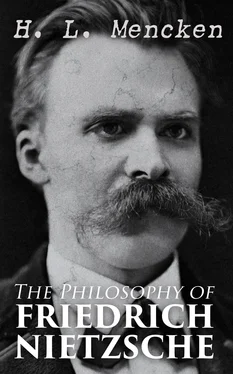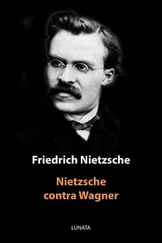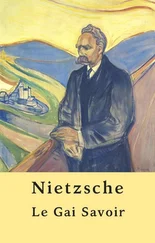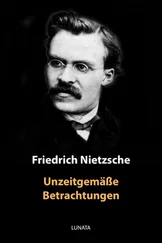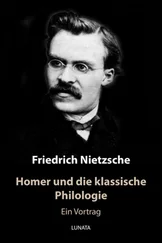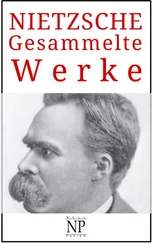In his discourses Zoroaster voices the Nietzschean idea of the superman—the idea that has come to be associated with Nietzsche more than any other. Later on, it will be set forth in detail. For the present, suffice it to say that it is the natural child of the notions put forward in Nietzsche's first book, "The Birth of Tragedy," and that it binds his entire life work together into one consistent, harmonious whole. The first part of " Also sprach Zarathustra " was published in 1883, the second part following in the same year, and the third part was printed in 1884. The last part was privately circulated among the author's friends in 1885, but was not given to the public until 1892, when the entire work was printed in one volume. As showing Nietzsche's wandering life, it may be recorded that the book was conceived in the Engadine and written in Genoa, Sils Maria, Nice and Mentone.
"Jenseits von Gut und Böse " ("Beyond Good and Evil") appeared in 1886. In this book Nietzsche elaborated and systematized his criticism of morals, and undertook to show why he considered modern civilization degrading. Here he finally formulated his definitions of master-morality and slave-morality, and showed how Christianity was necessarily the idea of a race oppressed and helpless, and eager to escape the lash of its masters.
" Zur Genealogie der Moral " ("The Genealogy of Morals"), which appeared in 1887, developed these propositions still further. In it there was also a partial return to Nietzsche's earlier manner, with its merciless analysis of moral concepts. In 1888 Nietzsche published a most vitriolic attack upon Wagner, under the title of " Der Fall Wagner " ("The Case of Wagner"), the burden of which was the author's discovery that the composer, starting, with him, from Schopenhauer's premises, had ended, not with the superman, but with the Man on the cross. " Götzendämmerung " ("The Twilight of the Idols") a sort of parody of Wagner's " Götterdämmerung " ("The Twilight of the Gods") followed in 1889. " Nietzsche contra Wagner " ("Nietzsche versus Wagner") was printed the same year. It was made up of extracts from the philosopher's early works, and was designed to prove that, contrary to the allegations of his enemies, he had not veered completely about in his attitude toward Wagner.
Meanwhile, despite the fact that his health was fast declining and he was approaching the verge of insanity, Nietzsche made plans for a great four volume work that was to sum up his philosophy and stand forever as his magnum opus. The four volumes, as he planned them, were to bear the following titles:
1 "Der Antichrist: Versuch einer Kritik des Christenthums" ("The Anti-Christ: an Attempt at a Criticism of Christianity").
2 "Der freie Geist: Kritik der Philosophie als einer nihilistischen Bewegung" ("The Free Spirit: a Criticism of Philosophy as a Nihilistic Movement").
3 "Der Immoralist: Kritik der verhängnissvollsten Art von Unwissenheit, der Moral" ("The Immoralist: a Criticism of That Fatal Species of Ignorance, Morality").
4 "Dionysus, Philosophie der ewigen Wiederkunft" ("Dionysus, the Philosophy of Eternal Recurrence").
This work was to be published under the general title of " Der Wille zur Macht: Versuch einer Umwerthung aller Werthe " ("The Will to Power: an Attempt at a Transvaluation of all Values"), but Nietzsche got no further than the first book, " Der Antichrist " and a mass of rough notes for the others. " Der Antichrist " probably the most brilliant piece of writing that Germany had seen in half a century, was written at great speed between September 3rd and September 30th, 1888, but it was not published until 1895, six years after the philosopher had laid down his work forever.
During that same year C. G. Naumann, the Leipsic publisher, began the issue of a definite edition of all his writings, in fifteen volumes, under the editorial direction of Frau Förster-Nietzsche, Dr. Fritz Koegel, Peter Gast and E. von der Hellen. In this edition his notes for " Der Wille zur Macht " and his early philological essays were included. The notes are of great interest to the serious student of Nietzsche, for they show how some of his ideas changed with the years and point out the probable structure of his final system, but the general reader will find them chaotic, and often incomprehensible. In October, 1888, but three months before his breakdown, he began a critical autobiography with the title of " Ecce Homo ," and it was completed in three weeks. It is an extremely frank and entertaining book, with such chapter headings as "Why I am so Wise," "Why I Write Such Excellent Books" and "Why I am a Fatality." In it Nietzsche sets forth his private convictions regarding a great many things, from cooking to climates, and discusses each of his books in detail. " Ecce Homo " was not printed until 1908, when it appeared at Leipsic in a limited edition of 1250 copies.
In January, 1889, at Turin, where he was living alone in very humble quarters, Nietzsche suddenly became hopelessly insane. His friends got news of it from his own hand. "I am Ferdinand de Lesseps," he wrote to Prof. Burckhardt of Basel. To Cosima Wagner: "Ariadne, I love you!" To Georg Brandes, the Danish critic, he sent a telegram signed "The Crucified." Franz Overbeck, an old Basel friend, at once set out for Turin, and there he found Nietzsche thumping the piano with his elbows and singing wild songs. Overbeck brought him back to Basel and he was confined in a private asylum, where his general health greatly improved and hopes were entertained of his recovery. But he never got well enough to be left alone, and so his old mother, with whom he had been on bad terms for years, took him back to Naumburg. When, in 1893, his sister Elizabeth returned from Paraguay, where her husband had died, he was well enough to meet her at the railroad station. Four years later, when their mother died, Elizabeth removed him to Weimar, where she bought a villa called " Silberblick " (Silver View) in the suburbs. This villa had a garden overlooking the hills and the lazy river Ilm, and a wide, sheltered veranda for the invalid's couch. There he would sit day after day, receiving old friends but saying little. His mind never became clear enough for him to resume work, or even to read. He had to grope for words, slowly and painfully, and he retained only a cloudy memory of his own books. His chief delight was in music and he was always glad when someone came who could play the piano for him.
There is something poignantly pathetic in the picture of this valiant fighter—this arrogant ja-sager —this foe of men, gods and devils—being nursed and coddled like a little child. His old fierce pride and courage disappeared and he became docile and gentle. "You and I, my sister—we are happy!" he would say, and then his hand would slip out from his coverings and clasp that of the tender and faithful Lisbeth. Once she mentioned Wagner to him. " Den habe ich sehr geliebt! " he said. All his old fighting spirit was gone. He remembered only the glad days and the dreams of his youth.
Nietzsche died at Weimar on August 25, 1900, the immediate cause of death being pneumonia. His ashes are buried in the little village of Röcken, his birthplace.
1." Friedrich Nietzsche in seinen Werken ;" Vienna, 1894.
2.Preface to " Morgenröte ," § 2; autumn, 1886.
V. THE PHILOSOPHER AND THE MAN
Table of Contents
"My brother," says Frau Förster-Nietzsche, in her biography, "was stockily and broadly built and was anything but thin. He had a rather dark, healthy, ruddy complexion. In all things he was tidy and orderly, in speech he was soft-spoken, and in general, he was inclined to be serene under all circumstances. All in all, he was the very antithesis of a nervous man.
Читать дальше
